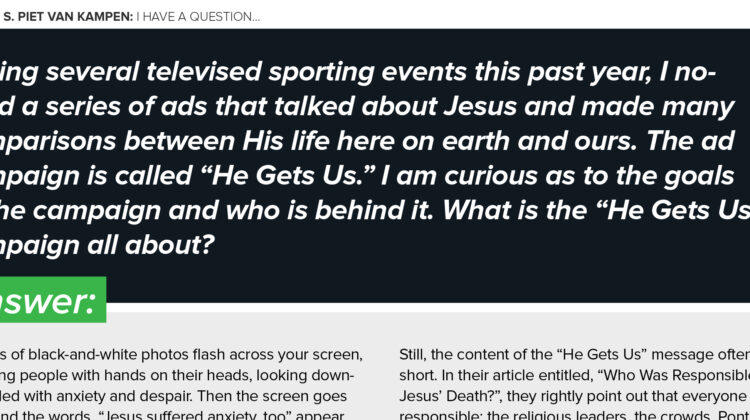
Question: During several televised sporting events this past year, I noticed a series of ads that talked about Jesus and made many comparisons between His life here on earth and ours. The ad campaign is called “He Gets Us.” I am curious as to the goals of the campaign and who is behind it. What is the “He Gets Us” campaign all about?
Answer: A series of black-and-white photos flash across your screen, depicting people with hands on their heads, looking downcast, filled with anxiety and despair. Then the screen goes black and the words, “Jesus suffered anxiety, too” appear, followed by, “He gets us,” which fades together into “Jesus.”
The ad only lasts fifteen seconds, but the powerful imagery burns itself into your memory. This particular television spot, entitled “Anxiety,” is just one of a series of short videos exploring aspects of Jesus’ humanity. “The Rebel,” “Outrage,” and “Dinner Party” are some other titles. The videos draw attention to the life of Jesus in the hopes of engaging people who have heard of Jesus, but do not know much about Him. Videos direct viewers to a website where they can read about Jesus’ life and ministry, begin a Bible reading plan, connect with others, and request prayers.
The videos are part of a campaign entitled, “He Gets Us.” He Gets Us is backed by an organization called Servant Foundation, also known as The Signatory, a 501c3 charity that has reported over a billion dollars in contributions. The ad campaign officially wrapped up at the end of 2022.
According to their website, “He Gets Us is a movement to reintroduce people to the Jesus of the Bible and his confounding love and forgiveness. We believe his words, example, and life have relevance in our lives today and offer hope for a better future.” The people behind “He Gets Us” state that they are not associated with any particular denomination or church, but describe themselves as Christians “who believe [Jesus] was more than just a good guy and a profound teacher… that Jesus is the son of God, who came to Earth, died, and was resurrected, then returned to heaven and is alive today.”
We confessional Lutherans can find much to applaud in the efforts of a campaign like “He Gets Us.” Their videos have drawn over 30 million YouTube views and 10 million prime-time television ad views. Roughly 10,000 people have signed up for Bible reading plans as a result of the campaign. Their videos have indeed raised awareness about the life of our Lord and Savior, making Jesus’ life relatable to the struggles and hardships that many in our world face today.
Still, the content of the “He Gets Us” message often falls short. In their article entitled, “Who Was Responsible for Jesus’ Death?”, they rightly point out that everyone was responsible: the religious leaders, the crowds, Pontius Pilate, and the Roman soldiers. Yet they cannot bring themselves to point the finger at the reader and say, “Because of your many sins, Jesus’ death is your fault.” Nor do they speak of the forgiveness of humanity’s sins that Jesus accomplished by His death. Instead, the authors moralize what took place on Good Friday: “When Jesus was the object of injustice, he chose forgiveness… In a world of finger-pointing and blame-placing, Jesus’ approach is radical. We think living by it would change everything.” This approach to Jesus’ life is consistent with the stated mission of “He Gets Us” from their website:
“Ultimately, we want people to know [Jesus’] teachings and how he lived while here on earth. And this will be a starting point to understand him and his message… We’re simply inviting you to explore with us at He Gets Us how might things be different if more people followed his example.”
While their material can often make a suitable “starting point” for further study, in the end, “He Gets Us” offers something other than the pure gospel that has been handed down to us in Scripture. “He Gets Us” claims to offer a path to a “better life” in Jesus—not eternal life with our Lord, but rather a better, more moral life here and now that follows Jesus as a lawgiver and not a Savior. For that reason, while we give thanks that people are led into Scripture and the knowledge of Jesus, we cannot support or recommend “He Gets Us.”
Pastor S. Piet Van Kampen
Christ the King Lutheran Church, Green Bay, WI